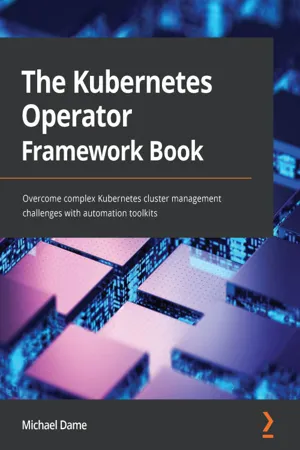
- 328 pages
- English
- ePUB (mobile friendly)
- Available on iOS & Android
The Kubernetes Operator Framework Book
About this book
Design and deploy an operator for personal use and public distribution and get to grips with writing, packaging, and distributing a basic operator for a Kubernetes clusterKey Features• Develop a holistic understanding of operators and the Operator Framework• Learn to design and develop your own operators as per industry standards• Find out how to implement best practices and troubleshoot Kubernetes operatorsBook DescriptionFrom incomplete collections of knowledge and varying design approaches to technical knowledge barriers, Kubernetes users face various challenges when developing their own operators. Knowing how to write, deploy, and pack operators makes cluster management automation much easier – and that's what this book is here to teach you.Beginning with operators and Operator Framework fundamentals, the book delves into how the different components of Operator Framework (such as the Operator SDK, Operator Lifecycle Manager, and OperatorHub.io) are used to build operators. You'll learn how to write a basic operator, interact with a Kubernetes cluster in code, and distribute that operator to users. As you advance, you'll be able to develop a sample operator in the Go programming language using Operator SDK tools before running it locally with Operator Lifecycle Manager, and also learn how to package an operator bundle for distribution. The book covers best practices as well as sample applications and case studies based on real-world operators to help you implement the concepts you've learned.By the end of this Kubernetes book, you'll be able to build and add application-specific operational logic to a Kubernetes cluster, making it easier to automate complex applications and augment the platform.What you will learn• Gain insight into the Operator Framework and the benefits of operators• Implement standard approaches for designing an operator• Develop an operator in a stepwise manner using the Operator SDK• Publish operators using distribution options such as OperatorHub.io• Deploy operators using different Operator Lifecycle Manager options• Discover how Kubernetes development standards relate to operators• Apply knowledge learned from the case studies of real-world operatorsWho this book is forThis book is for DevOps and cloud engineers, Kubernetes engineers, SREs, developers, and cloud architects interested in automating the management of their Kubernetes clusters. It assumes a basic understanding of core Kubernetes topics or familiarity with Kubernetes and container orchestration.
Tools to learn more effectively

Saving Books

Keyword Search

Annotating Text

Listen to it instead
Information
Table of contents
- The Kubernetes Operator Framework Book
- Contributors
- Preface
- Part 1: Essentials of Operators and the Operator Framework
- Chapter 1: Introducing the Operator Framework
- Chapter 2: Understanding How Operators Interact with Kubernetes
- Part 2: Designing and Developing an Operator
- Chapter 3: Designing an Operator – CRD, API, and Target Reconciliation
- Chapter 4: Developing an Operator with the Operator SDK
- Chapter 5: Developing an Operator – Advanced Functionality
- Chapter 6: Building and Deploying Your Operator
- Part 3: Deploying and Distributing Operators for Public Use
- Chapter 7: Installing and Running Operators with the Operator Lifecycle Manager
- Chapter 8: Preparing for Ongoing Maintenance of Your Operator
- Chapter 9: Diving into FAQs and Future Trends
- Chapter 10: Case Study for Optional Operators – the Prometheus Operator
- Chapter 11: Case Study for Core Operator – Etcd Operator
- Other Books You May Enjoy
Frequently asked questions
- Essential is ideal for learners and professionals who enjoy exploring a wide range of subjects. Access the Essential Library with 800,000+ trusted titles and best-sellers across business, personal growth, and the humanities. Includes unlimited reading time and Standard Read Aloud voice.
- Complete: Perfect for advanced learners and researchers needing full, unrestricted access. Unlock 1.4M+ books across hundreds of subjects, including academic and specialized titles. The Complete Plan also includes advanced features like Premium Read Aloud and Research Assistant.
Please note we cannot support devices running on iOS 13 and Android 7 or earlier. Learn more about using the app